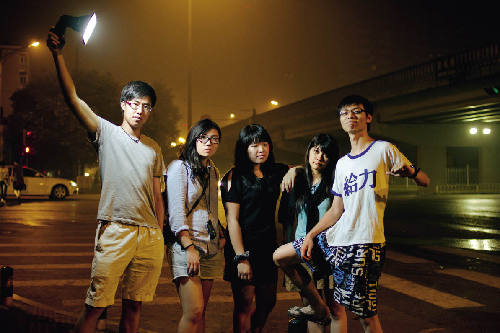By staff reporter LU RUCAI
By staff reporter LU RUCAI
IN today’s China, there is a group of people born in the 1980s and 1990s who have left their hometowns to seek fortunes in big cities; they are single; they spend everything they earn on day-to-day living expenses, so they can’t afford to buy an apartment or a car. They long for a better life, but are struggling and wandering between dream and reality. In fact, they have no idea what their future has in store. But despite feeling lost, they persist in pursuing the dreams they had in the very beginning. They persist even if their dreams abandon them, and until such persistence becomes their life.” So remarked photographer Tian He as he described the theme of his photo series Photos of Their Youth.
But why did he choose this theme? Tian He explained that it all started from his own despondency with life. He wanted to find out more about the lives of his peers. Eventually, he discovered, “We are unsatisfied with reality because we have our dreams and an overwhelming optimism means that we keep fighting and pursuing our dreams with a determined mind.”
|
 |
| Lu Yuxin (second, left) and her friends from Hong Kong all think that Beijing is an inclusive city. |
Chasing Dreams in Big Cities
Tian He, who was born in 1985, has lived in Beijing for six years, a migrant like many of his peers. In early 2011, he quit his job at a TV station and went to study photography at Beijing Film Academy. In the same year, his series of pictures entitled The People of Northwest China was exhibited at the China Pingyao International Photography Festival. Now, Tian is a photographer dedicated to practicing his art to benefit the public, not for financial gain. His many photos have been published on a number of reputable Chinese media platforms.
“In order to stay afloat in big cities, sometimes we have to do a job that we don’t really like; we hide our true selves to keep our dignity and we endure the loneliness.” His words are poetic, but full of melancholy. Yet he persists in pursuing his dream in Beijing.
Most of the young people captured through his lens are like him. They all live a big city dream.
Tian Song from Baoding City of Hebei Province was among one of the first groups of people that Tian He chose for his photo series. At that time, Tian Song was still looking for a job, having arrived in Beijing two months earlier. Tian Song graduated from college, having majored in environmental art design, in 2011 and one year later was encouraged by relatives and friends to come to Beijing. Tian He’s photograph of Tian Song sees the subject positioned in front of a wall decorated with Beijing Opera masks. He wanted to portray Tian Song as a representative of young people who came to Beijing alone to pursue their dreams, looking forward to his new life in a big city.
Unlike Tian Song, Yu Qing, another subject of the photo series, was not worried about finding a job. He simply wanted to follow his heart. Yu is from Jingdezhen of Jiangxi Province, China’s porcelain capital. He had a stable job at the local weather bureau, but was getting sick of the tedium of “a cup of tea and a newspaper” every day. He quit his seemingly stable job and went to Beijing alone. At first, he worked for a media company in a combined role as photographer, director and editor. “I think the only thing not in my job description was shooting myself with my camera!” Yu joked. Tian He’s impression of Yu Qing was that he seemed to lead a full and busy life, but still looked lost. “Life always forces you to compromise on something that you shouldn’t really care that much about, like food and rent. And other more meaningful things have to make way for those necessities,” Yu’s words were incisive and realistic for Tian He. Under the pressure of subsistence, sometimes the young generation must learn to give in.
“Although they have plenty of free time, they can’t go out anywhere in Beijing because if they do, they spend money,” Tian said. That is common thinking among the dream chasers in Tian He’s pictures. They only work and earn money. Their leisure time is spent watching TV or playing video games in rented accommodation.